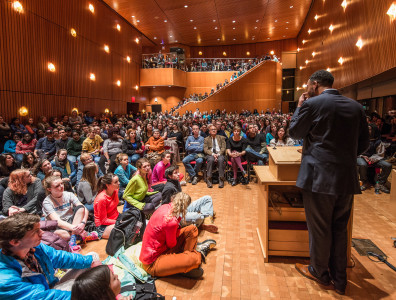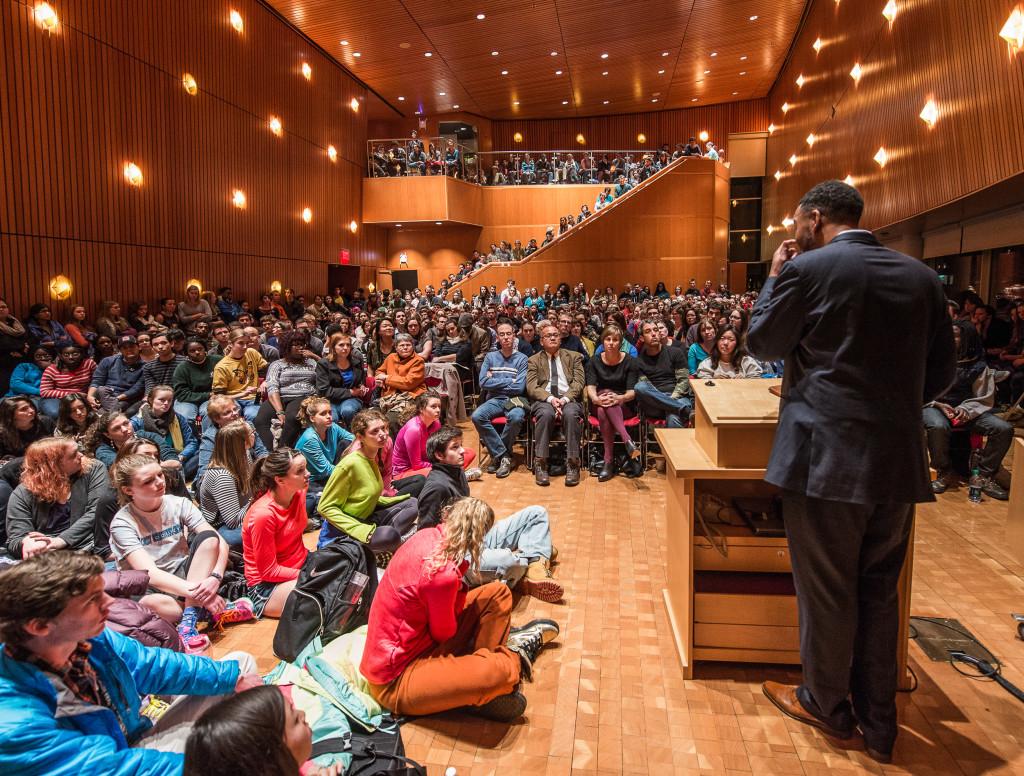On Tuesday, Jan. 20, Grinnell College welcomed its second speaker in a series of lectures honoring Martin Luther King Jr. Day. Ta-Nehisi Coates, a national correspondent for The Atlantic, spoke to a packed audience in JRC 101 on “The Case for Reparations,” which complemented and expanded on his June article by the same name. In his presentation, Coates discussed the long history of the “system of plunder” of black people and communities and the persistence of white supremacy in America.
The event was sponsored by multiple offices and programs affiliated with the College, including the Office of Diversity and Inclusion, the Rosenfield Program and the Office of the President.
Coates’ discussion of racism in America was primarily centered on history and systemic issues, rather than on individual actions and attitudes.
“Racism is talked about as a problem of manners,” Coates explained. “We have a whole political vocabulary around rac
-ism that focuses on individual goodness and individual badness. And the causality to that vocabulary is not focusing on
systemic problems and systemic issues … It’s not simply a matter of being a good or bad person. It’s a matter of how we’ve structured certain systems so that there would be certain outcomes.”
Additionally, Coates, both in his article and his presentation, focused on the economic disparity that he believes would be solved by reparations to those who are the victims of this systemic problem.
“When I try to understand the chasm between [black America and white America] it was not a matter of the heart, it was not a matter of love, it was a matter of the pocketbook,” Coates said.
Economics, Coates claims, has been at the heart of racism and white supremacy since the beginnings of slavery, a fact that he views to be widely misrepresented in history and America’s collective memory.

Photo by John Brady
“What sticks with me, even to this day, is how ahistorical our conversation is. Any nation, or any society will begin the conversation at the point that most favors it. … My job as a writer is to reject that and to live outside of that,” Coates said.
He stated that America’s misremembering of its historic racism and economic mistreatment of black people is what pushed him to write “The Case for Reparations” for The Atlantic.
“I thought if we were going to be intellectually serious and intellectually mature about this, we would have to admit that for most of this country’s history, its policy toward black people has been racist. If that’s the case there would be some effects. So as much as it was an attempt to think about solutions, there’s an attempt to understand why things were the way they were,” Coates said.
To Coates, taking a critical attitude toward one’s country is an essential part of citizenship and their intellectual responsiblity as students.
“Especially for young people, I want to encourage them toward a more robust concept of citizenship that is not just voting and does not revolve around doing your part and then you go home,” he said. “Being an intellectual is part of being a citizen. … They have a responsibility to think about their country and to think critically and not just to nod and go along with whatever’s going on and to accept the world as it is right now.”
Coates’ lecture was very well attended and warmly received, with audience members struggling to fit into JRC 101 and packed in from staircase to ceiling. After the presentation, Shaquall Brown ’15 praised Coates’ speech as the best she has heard at Grinnell so far.
“I thought that this was the best MLK Day speaker that I’ve had all four years,” Brown said.
Dixon Romeo ’16 was similarly impressed with both the breadth and depth of Coates’ lecture
“Usually when speakers come they don’t delve deep into the specifics of the article, they kind of just coast over it for the general public, but I thought this was really good,” Romeo said.


































































